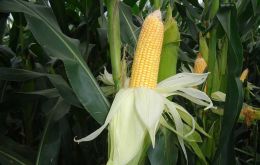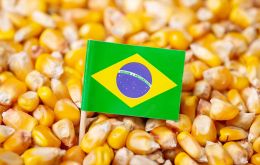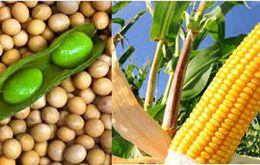MercoPress. South Atlantic News Agency
Tag: corn
-
Friday, April 18th 2025 - 10:42 UTC
Paraguayan corn exports boosted by Brazilian demand

Between January and March 2025, Paraguayan corn exports rose by 84,000 tons compared to the same period in 2024, generating US$ 69 million in foreign currency, a US$ 15 million increase.
-
Wednesday, January 15th 2025 - 08:47 UTC
Brazil’s 2024/25 harvest production estimated to reach 322.2 million tons, with soy exports of 105 million tons

Brazilian farmers should harvest 322,2 million tons of grains from the 2024/25 crop, representing an 8,2% increase over 2023/24, equivalent to an additional 24.5 million tons, according to the latest estimates from Conab, the county’s National Supply Company.
-
Monday, April 22nd 2024 - 12:28 UTC
Downward revision reported for Argentine 2024 agricultural exports

Argentina's 2024 exports of soybean, corn, wheat, sunflower, and barley have been projected to reach barely US$ 29.3 billion, which would represent a US$ 5.7 billion recovery from 2023 but a US$ 1.7 billion slump compared to the last five years' average, the Grain Stock Exchange in Rosario (BCR) announced in its latest Guía Estratégica para el Agro (GEA) report. The new figures represent an 18% downward revision from December's calculations.
-
Thursday, May 25th 2023 - 10:06 UTC
Brazil expects a record second crop of corn, some 102,4 million tons

As the harvest of soybeans has taken longer, the pace of corn planting in Paraná, the second largest corn producer in Brazil has been the slowest in history. The higher-than-expected productivity in some areas of Brazil’s second corn crop (also known as “safrinha“) is expected to more than compensate for the planting delay and ensure record numbers in 2022/23.
-
Thursday, February 2nd 2023 - 10:15 UTC
Southern Brazil pork and poultry farmers concerned with Chinese demand for “overpriced” corn

Expectations of large Brazilian corn exports to China in 2023 are worrying Brazil’s meat companies, according to a statement from Santa Catarina’s meat processors lobby Sindicarne this week. The group said competition from Chinese buyers is already reducing local supplies and making corn used to feed poultry and pork an “overpriced” commodity.
-
Monday, November 7th 2022 - 09:55 UTC
Brazil soaring exports of corn and soybeans

Brazil maize exports reached almost 32 million tons in the first ten months of the year, which is more than double the volume shipped in the same period in 202, (14,5 million tons), according to the country's National Association of Cereal Exporters, ANEC.
-
Thursday, August 25th 2022 - 10:16 UTC
Second corn crop helps Brazil achieve a harvest of 271 million tons, and target 300 million tons in a near future

Brazil is forecasted to break another crop record in 2022 with the largst grain harvest in history, particularly because of the second crop of corn in Brazil, or safrinha. Previously considered merely a way to keep the soil in use between two important harvests, corn’s second crop gained importance as production became more sophisticated with the aid of technology.
-
Wednesday, March 16th 2022 - 20:58 UTC
South American corn seeks to offset Ukrainian supply to Europe

France and Spain have requested the European Union to loosen up its requirements for the import of cereals given the current impact the war in Ukraine is having on the price of food globally, it was reported.
-
Tuesday, November 10th 2020 - 11:44 UTC
Brazil allows import of genetically modified soy and corn from United States

Brazil has issued a protocol instruction legally authorizing imports of genetically modified (GM) soy and corn from the United States at a time when Brazil is dealing with low stocks and record prices for these products.
-
Friday, October 30th 2020 - 18:06 UTC
Drought impacts on Argentine corn planting and overall production and exports

Corn production in Argentina is likely to drop to 48 million tons in 2020-21 from 50 million tons in 2019-20, the US Department of Agriculture's Foreign Agricultural Service in Buenos Aires said in a report released on Thursday.
